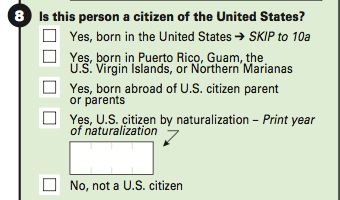However, it is also the first decennial census since 1870 in which zero citizens will be asked their marital status. It is the first since 1960 which will not report poverty status. The first since 1840 which will not report on school attendance. The first since 1930 which will not report on educational attainment (i.e. high school grad, college grad, etc.). The first since 1860 which will ask zero citizens about where their parents and/or ancestors were born. The first since 1840 which will ask zero citizens what they do for a living. The first since 1840 which will not ask if they live on a farm.
Why all these cuts? Because the Census Bureau, pursuant to legislation, replaced the long form of the Census with the American Community Survey (ACS).
From the Census Bureau's Introduction to the ACS
The Census Bureau’s American Community Survey is an ongoing survey that produces important statistics about our nation’s people and housing. It covers the same type of information that had been collected every 10 years from the decennial census long form questionnaire. The American Community Survey eliminated the need for a separate long form in the 2010 Census.
...
With the American Community Survey, it’s no longer necessary to rely on a single snapshot of an area that becomes increasingly dated throughout the decade. Instead, the survey provides a moving picture of community characteristics — a more efficient use of taxpayer dollars.
As it so happens, the most recent American Community Survey form, the 2009 American Community Survey, does, in fact, ask about citizenship.

Now, in 2000, the Census Bureau only asked about citizenship on the long form, which went to 1 out of 6 households. The American Community Survey asks about 3 million housing units these questions each year, so about 30 million housing units over a 10 year span. The United States has about 130 million housing units according to the latest available Census estimates, and 30/130 is greater than 1/6, so a larger percentage of people are being asked about citizenship this decade than last decade by the Census Bureau.
In fact, this is a larger percentage of citizens since they asked about citizenship on the short form in 1950 (the year, and all other years cited, come from a compilation of Census questions by Grace York at the University of Michigan Library). Apparently President Eisenhower was a major fan of illegal immigrants or something and dropped the question.
Of course, that's not fair to President Eisenhower, despite his suspiciously foreign-sounding name, nearly as bad as Obama. After all, the Census Bureau has never asked about the legal status of people. They have asked whether someone was free or a slave, back in the day when slaves were counted as 3/5 of a person, but never about their legal status in the country.

